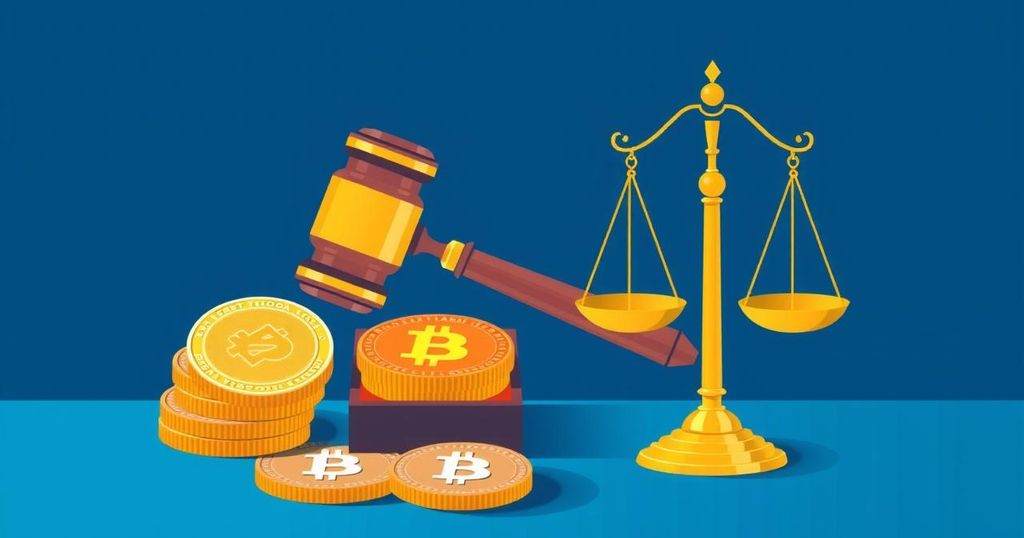Landmark Cryptocurrency Legislation Passes U.S. House, Awaits Trump’s Approval
- Historic cryptocurrency legislation has passed in the U.S. House.
- Bills in favor of crypto regulations and transparency are challenged by critics.
- The GENIUS Act sets standards but leaves gaps for evasion.
- Concerns arise over unregulated secondary markets for stablecoins.
- Advocates are calling for stricter consumer protections in crypto.
What Landmark Legislation Means for Cryptocurrencies
In a historic move, landmark cryptocurrency legislation has successfully passed the U.S. House, paving the way for new regulations on digital currencies. The slew of crypto bills, eagerly dubbed “Crypto Week” by Republican lawmakers, aims to establish a comprehensive regulatory framework. However, this well-celebrated progress comes with warnings from critics, who are concerned that the measures could fall short of preventing illicit financial flows and protecting consumers.
GENIUS Act and Its Implications
Among the notable bills is the Guiding and Establishing National Innovation for U.S. Stablecoins, or GENIUS, Act. This legislation, backed by bipartisan support, sets federal standards for stablecoins, digital currencies pegged to traditional assets, like the dollar or euro. This new law requires stablecoin issuers to maintain reserve assets equivalent to their digital currency offerings, which brings some level of stability to the market, but critics are still ringing alarm bells regarding gaps in the regulations. Prominent voices argue that the secondary market remains largely unregulated, presenting a loophole that could be exploited.
Concerns Surrounding the Secondary Market
As the process rolls forward, there’s a growing discourse around a secondary market that many believe hasn’t been adequately addressed. The legislation’s apparent lack of oversight on foreign-issued stablecoins is particularly worrisome. Activists are raising concerns about the so-called “Tether loophole,” where stablecoins like USDT can circumvent U.S. regulations through international transactions. Transparency International has urged lawmakers to include stringent definitions in the bills to cover such channels to prevent the digital currency landscape from becoming a haven for money laundering.
Digital Asset Market Clarity Act Raises Mixed Reactions
Additionally, there’s another bill in the mix, known as the Digital Asset Market Clarity Act, which plans to clarify when a cryptocurrency qualifies as a security versus a commodity. This has sparked criticism, as many feel that the lack of comprehensive compliance measures still allows for questionable practices in the crypto industry to persist. Advocates worry that insufficient protections against insider trading and market manipulation could create a scenario where corrupt practices flourish, much like they did in the 2008 crisis. This confidence in existing weak regulations has many experts bewildered, as they call for stricter rules to ensure fair play in the evolving market.
Consumer Protection Concerns Are Gaining Attention
On another front, representatives are wary of the Anti-CBDC Surveillance State Act, which aims to prevent the Federal Reserve from issuing a central digital currency. This initiative aligns with Trump’s calls for quick action on crypto regulations but might leave the door open to skepticism about privacy and regulatory overreach. Meanwhile, activists continue to point out a troubling trend of increasing crypto-related scams, which have become prevalent, especially with the digital currency’s rapid global growth. The total reported losses related to these scams keep climbing, emphasizing the urgent need for consumer protection and greater awareness.
A Call for Comprehensive Solutions to Crypto Regulation
Critics of the current bills emphasize that there’s more work to be done for meaningful protections to take shape in this new frontier. Advocates highlight that effective regulation isn’t just about establishing rules; it’s also about enabling safe practices in an industry that could otherwise weave itself into the fabric of lawlessness if left unmanaged. Many experts echo the sentiment that comprehensive solutions require collaboration among all stakeholders to ensure the integrity of the financial landscape. The message sent by these bills reflects a potential leap forward, but there remain several challenges toward true financial oversight and prevention of exploitation.
The Broader Implications of U.S. Legislative Actions
In the broader picture, the legislation signifies a major step for the U.S. as it grapples with the implications of a burgeoning crypto market. Supporters tout it as ushering a new era of innovation in the digital asset space, yet the critics caution that the current drafted laws might just be putting a band-aid on a larger problem. As the ink dries on this legislation, many are left wondering if President Trump’s decisive push will truly make the U.S. the crypto capital of the world or if it will simply highlight the loopholes still waiting to be addressed.
Navigating the Future of Crypto Regulation
As the crypto landscape evolves, the stakeholders involved find themselves at a critical juncture where the balance between innovation and regulation is pivotal. Strengthening consumer protections should be paramount alongside fostering an environment conducive to growth in the digital financial sphere. With skeptics and advocates alike observing closely, it’s apparent that more rigorous discussions and measures will be necessary to create a stable and secure crypto environment moving forward. This moment marks a clear transition point for the industry, but vigilance is needed to ensure it doesn’t backfire as the trend unfolds.
The recent passage of landmark crypto legislation marks a significant moment for U.S. regulatory efforts—though there are calls for deeper scrutiny of loopholes, especially those aiding money laundering. Critics argue that without addressing these gaps in stablecoin oversight, the legislation may not effectively safeguard consumer interests or deter illicit financial activities. As President Trump prepares to sign these bills into law, many stakeholders will be watching closely to ensure that the initiative leads to real transparency and accountability in the crypto space.




